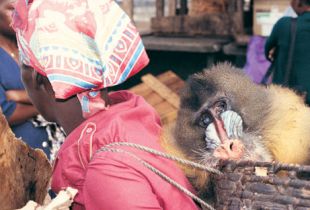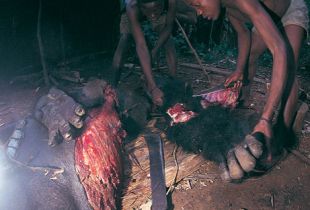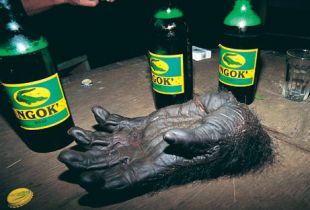What is Bushmeat?
In Africa, the forest is called 'the bush' - meaning that any animal that comes from the forest becomes 'bushmeat' when it is killed and prepared for the table. Bushmeat can just as easily refer to a common species, legally hunted and eaten, as to an endangered species, protected by national and international laws. For indigenous African populations, the eating of bushmeat is traditional, and given a small human population and healthy wildlife populations in the existing forests, this would not be a problem. However, as human populations grow exponentially, and forests disappear rapidly, the eating of bushmeat is no longer a sustainable practice.
The scale of the problem
There have been a number of campaigns in the past that have created an awareness of the bushmeat problem on local and global scales. If you do an online search, you will be flooded with information. Why has all this information not yet managed to alleviate the problem?
Unfortunately, there are high levels of political corruption in Africa and laws are not always enforced, including those that protect endangered species. In addition, most people in Africa are struggling to survive, jobs are difficult to come by, and things like cars and refrigerators are luxury items. How do you store meat without a refrigerator? In West Africa, climate and forest growth inhibit the type of farming techniques used in the more developed world. It is not difficult to understand how all these factors interplay to result in bushmeat being a staple protein source - and sometimes the ONLY protein source available, especially to villagers in remote areas.
Commercial logging has brought roads and non-indigenous people (workers) into formerly undisturbed areas. As a result, bushmeat consumption has increased locally. In addition, meat is smuggled on logging trucks into the city markets. Africans sometimes prefer bushmeat to the taste of domestic meat - much the way you remember foods your mother cooked you as a child. Bushmeat is most popular during holiday times, when people return to traditional foods. Because of these preferences, some West African immigrant populations in developed countries also desire traditional tastes and as a result, bushmeat is smuggled into many areas around the world. And it is not only Africans that are eating bushmeat - sometimes, wild animals are even featured in expensive specialty restaurants for people looking for an 'exotic' meal.
Hunting and eating meat that comes from the forest is a fact of life for many Africans. While local consumption in Africa can, in some cases, be managed, it is not possible for bushmeat to be eaten on a global scale. What would you do if someone told you that you must stop eating meat? Protein is important to human health. Alternative protein sources for Africa must be explored or much of its wildlife will disappear as the human population grows.


























